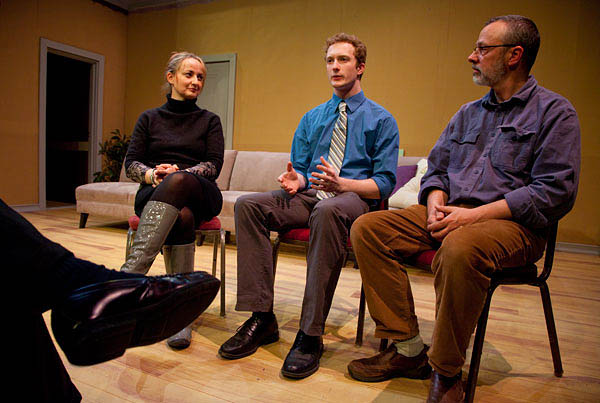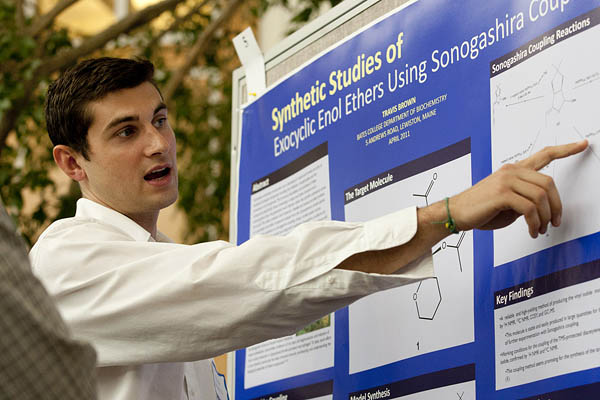
Mount David Summit will dazzle with work in physical and social sciences, humanities, arts

Travis Brown ’11 of East Greenwich, R.I., explains his chemistry research at the 2011 Mount David Summit. Photograph by Phyllis Graber Jensen/Bates College.
The 11th annual Mount David Summit, Bates College’s showcase of student academic achievement, begins at 1:30 p.m. Friday, March 30, in Pettengill Hall, 4 Andrews Road (Alumni Walk).
Throughout the afternoon, students will present research and creative work in poster sessions, short talks, panel discussions, a photography exhibition and film screenings.
Capping the day is a 7:30 p.m. performance featuring original choreography by the Bates College Modern Dance Company in Schaeffer Theatre, 305 College St., followed by an alternate program at 5 p.m. Saturday (admission is $6 / $3 at batestickets.com). Also on Saturday, at 8 p.m., is the spring concert of the Bates College Gamelan Orchestra in Olin Concert Hall, 75 Russell St., featuring guest artists from Indonesia and the U.S. (free admission, but tickets required; call 207-786-6135).
The public is invited to attend the Friday afternoon events at no cost. For more information, please visit www.bates.edu/summit/ or call 207-753-6952.
“The summit gives students the chance to share the results of their original research, which is a hallmark of the Bates education,” says Pamela Baker, vice president for academic affairs and dean of the faculty. “It showcases the breadth of scholarship among our students and the dedication of their faculty mentors.”
She adds, “We enjoy welcoming the diverse audience that attends the summit: students, faculty, staff, families, students admitted to the Class of 2016, generous donors to scholarship and research funds, community members. It’s a spectacular day at Bates!”
Bates College held the inaugural Mount David Summit in 2002. A decade later, the summit has blossomed into one of the premier events in the college calendar. While that first summit featured the work of 50 students, this year 333 students, representing 26 disciplines and advised by 65 members of the faculty, will take part.
Summit highlights
- Reflecting an ongoing collaboration between the foreign language and creative writing programs, students of non-English languages will read their translations of poetry written in English by other students in creative writing courses, and will discuss the challenges of translating.
- In addition, two Russian-language students will talk about the process of subtitling films in translation and will screen subtitled clips; and thesis students in creative writing will read recent work in various genres.
- Biology students doing public-health theses will discuss community-based research projects dealing with health issues for pregnant women and new mothers.
- Geology students will present thesis research conducted at the Bates-Morse Mountain Conservation Area and nearby Seawall Beach in Phippsburg, Maine’s longest undeveloped barrier beach.
- Two students will talk about alien abduction stories and show clips from a film they made.
- A politics class will present an interactive session on the challenges of ocean governance, with audience members visiting in-room information stations focusing on particular topics and testing their knowledge.
- Bates’ international reach will be addressed in panels on Middle East politics; U.S.-Mexico immigration experiences; and protests in Spain and Bolivia. Another panel features students who did research while studying abroad; and students who took part in last autumn’s Fall Semester Abroad program in Nantes, France, will describe their experiences.
- Travis Jones, a junior from Ithaca, N.Y., will explain his process as a theatrical scenic designer, from initial consultation with directors to research, sketches, models and a finished set in Gannett Theater.
Poster presentations delve deeply into biology, chemistry, neuroscience and psychology, with dozens of students presenting research on a wide spectrum of topics in these fields. An introductory African studies class will present seven posters exploring issues in contemporary Africa.
Economics, environmental studies, anthropology, math and politics are among other disciplines that students will cover.



